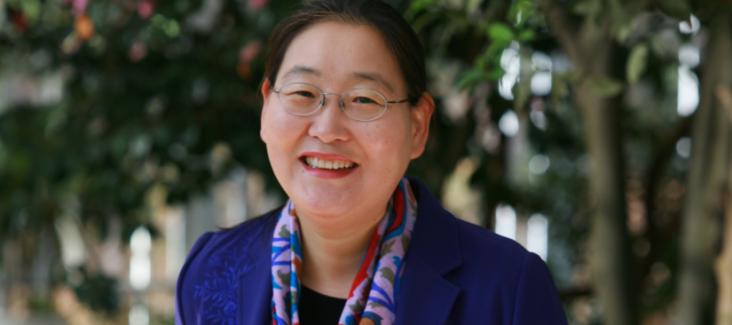Democracy International: In your opinion, why do we need to democratize the world?
We have witnessed the limitations of all kinds of dictatorships, whether it is a monarchy or a republic, whether it is with the good cause based philosophical guidelines or with surveillance. Sometimes the dictatorship has been legitimized for the economic development or for the national wellbeing. However, all these ‘so called’ excuses could not counterbalance the problematics. The Democratic decision-making process proves to be a viable alternative to these historical trials and errors. The only thing that we have not experienced yet is the better or the more democracy. Democracy has started with simple logic and could be transformed and improved. We left no stone unturned except true democracy. That’s why we couldn’t stop democratizing democracy.
Jung-Ok Lee: What is your view of the European Citizens' Initiative?
The ECI is something better than nothing. Symbolically, it is meaningful to democratize the ‘super national entity’, which has framed and regulated ordinary people’s life and sustainable future. Even ordinary people in each country could feel it their own political tool. However the symbolic meaning should also provide practical results. It should be combined with a referendum. At the moment the quorum is too high for the ordinary citizen to engage.
The gap between the rich and the poor is increasing. Do you see a connection between the social economic crisis and citizens’ participation? What should be done to fight this development?
Polarization became seriously recognized by the well-educated, but unemployed young people and the older people with job career. Some of those two groups became over politicized and evolved into generation politics over the pension policy etc., which sometimes blurred the classical class politics. Not only the economic gap, but also the polarization in political participation became accelerated. Overrepresentation and underrepresentation of certain voices should be paid due attention. To get over the powerlessness and alienation of ordinary people, direct democracy systems should be adopted before political cynicism became rooted down.
In your life, what triggered your activism for more democracy and citizen participation? Was there a key moment in your life?
During my student days, many of my friends dared to be in jail for expression of ‘no’ to dictatorship. I am among the few who can graduate and follow the academic career. I felt in moral and political debt to my activists colleagues. While I was driven by emotional and normative sensitiveness in justice and human right as a university student, I became demanded to suggest the pursuable solutions in NGO activities and academic society. I try to find a beautifully designed political tool to accommodate field voices. I did have the opportunity to encounter this direct democracy movement group.
What is the next political goal you want to achieve?
I have introduced the direct democracy as a useful tool to the concerned democrats through the field study tour to Switzerland and co-organize the 2nd GFMDD. I want to give my hands in institutionalizing the initiatives and referendums on a local and national level in Korea. And I want to share this new tool with my Asian friends who have searched this kind of tool. These days more and more people are gathering signatures to express their political will instead of showing it by resistances and demonstrations. People want to have political alternatives. I thought direct democracy could be a useful alternative.
What should Democracy International do to realize more democracy and citizen participation in the world?
Democracy International has already provided an extraordinary space for the international board members to cross their physical and mental borders and to share the concerns to democratize democracy with the practical tool of direct democracy. Through Democracy International, I want to share the like-mindedness and also the differences in institutional levels and citizenship development levels. In Korea, sometimes we have debated what should be prioritized between strengthening political parties and citizen’s direct participation. The consensus has been made towards paying more attention to the democratic citizenship education. I thought the good comparisons could naturally lead to the politically correct awareness and learnings. The opportunities of comparisons are the real field text book. The initiatives and engagements into US Direct Democracy tour and Tunis GFMDD provided real step forward global participations. I do ask Democracy International should provide this educative mutual learning space.
Interviewed by Cora Pfafferott

